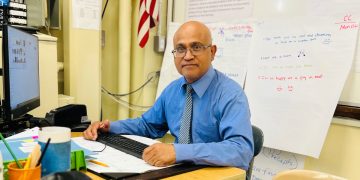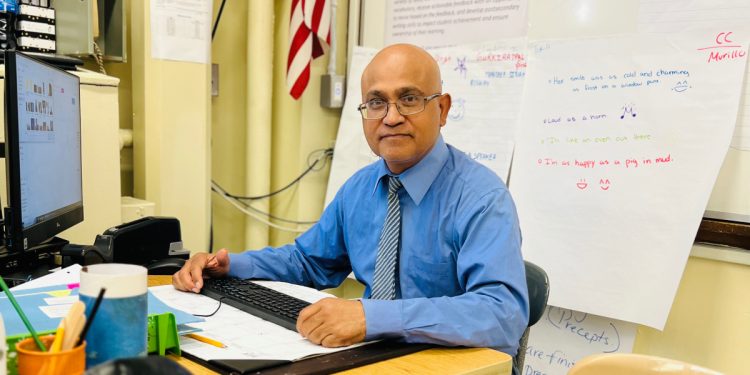Dr. Ved Prakash Nanda, who worked with Guyanese to expose human right violations during the 1980s and early 1990s, passed away earlier this month following a fall. He suffered a spinal injury last month and underwent surgery. But he never recovered from the injury. He was in hospice care where he died.
He worked with Ravi Dev, Ramesh Kalicharran, and I, Vishnu Bisram, through GOPIO to focus attention to the US Congress, the UN, and the global on rights violations and rigged elections. He, like several other academics and activists, called for the restoration of democratic governance in Guyana during the period of the dictatorship.
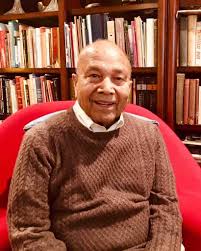
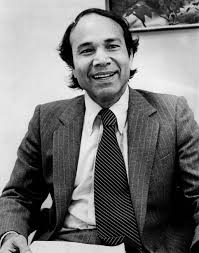 Nanda’s bio profile stated that he did M.A. in Economics from Punjab University, a Law degree from Delhi University in India, LLM from Northwestern University, and subsequently postgraduate fellowship work from Yale University. Then he was appointed a full Professor in Denver.
Nanda’s bio profile stated that he did M.A. in Economics from Punjab University, a Law degree from Delhi University in India, LLM from Northwestern University, and subsequently postgraduate fellowship work from Yale University. Then he was appointed a full Professor in Denver.
Prof Nanda taught American law, international law, and human rights for some five decades at the University of Denver before retiring. Dr. Nanda was a Distinguished University Professor and Thompson G. Marsh Professor of Law at the University of Denver, where he founded the International Legal Studies Program in 1972 and later directed the Ved Nanda Center for International and Comparative Law. He also did consultancy for the UN. He became a respected figure in academia. And he was held in high esteem by his students and by the university staff and administration where he taught. He also penned a weekly column for the Denver Post for many years. He became Chairman of the board of Hindu University America, a position he held for last six five years till his passing.
He was recipient of India’s Padma Bhushan award in 2018 for his contributions to the Indian community in America, human rights in girmitya countries, and to India.
I first met Prof. Ved Nanda Ji in 1987 when he came to New York for a meeting organized by Dr. Thomas Abraham, Sudha Acharya, Dhiren Solanki, Ram Ghadvi, Suresh Singh, among others, to plan and organize the first global convention of people of Indian origin. We met at several meetings and functions thereafter. He re-visited New York in 1988 as a feature speaker at the convention held at the Sheraton Center in August that year. He also chaired a plenary session. I was an attendee as well as a participant at his session to speak about human rights violations in Guyana. And he came to New York as well as in India at several other conferences of GOPIO where we interacted. Because he was only among a few who studied international relations and international law among the diasporic community in America, he was in constant demand from a wide variety of organizations and institutions including from Indo-Guyanese and Indo-Fijians for assistance to put together reports. With our request and assistance, we supplied and he collated reports on human rights violations in Guyana. He was well connected with Members of Congress, and through his intervention some of them helped us in the struggle for free and fair elections in Guyana. The report was sent to Congress and the UNC and elsewhere. His connection with Members of Congress helped us in the struggle for free and fair elections in Guyana.

Ravi Dev also met Ved Nanda at the GOPIO convention and at subsequent conferences, and we became better acquainted. Ramesh Kalicharran also knew Nanda well, and they met at the convention and follow up conferences. Both Ravi and I had the opportunity to work with Nanda on GOPIO conferences and human rights issues. He was very sharp in his thinking and quite witty. We had humorous exchanges at the convention and at multiple meetings. His experience as a senior academic and his skills and reputation as a human rights advocate were invaluable to GOPIO and to our (and the diaspora) struggle for free and fair elections in Guyana and Fiji. Ravi and I collaborated with him to write a report on human rights violations in Guyana and Fiji during the 1980s and early 1990s. That report was sent to the UN and to Members of Congress to apply pressure on the dictatorships of Guyana and Fiji to restore democratic rule. Democracy was restored in Guyana in October 1992 and in Fiji later that decade.
Media reports state that Professor Nanda was born in 1934, in Gujranwala, near Sialkot, British India (now in Pakistan). His family migrated to India following the partition in 1947.
Nanda ji was tireless in pursuing justice and peace. A tribute to him from a colleague states: “Throughout his life, he has worked tirelessly to promote understanding and cooperation among nations through his teaching, writing, and advocacy in the realm of international law”.
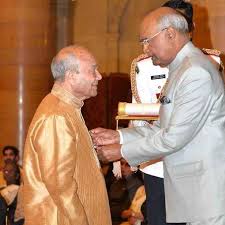
Another tribute states that “Prof. Ved Nanda served as Vice Provost at the University of Denver from 1994-2008 and has held numerous official posts in international, regional, and national professional and civil society organizations. He has also received several awards including the Gandhi, King, Ikeda Award for Community Peace Building. He had been the Sanghchalak (President) of the Hindu Swayamsevak Sangh (HSS), in America for many years, and guided its growth and development”.
Prime Minister Narendra Modi also showered accolades on him: “It is impossible to capture in a few short paragraphs, the multi-dimensional contributions of Prof. Ved Nanda as a Professor of Law, a Champion of Human rights around the world, an author who has left a legacy of over twenty-plus books and countless articles, and a champion of Hindu causes for more than six decades”.
Nanda ji was recipient of countless honors. In 2016, he received the Hiroshima Peace Prize. In 2018 he was presented with the Padma Bhushan, one of the highest civilian awards, by the then-president of India, Ram Nath Kovind.
Media reports stated that he held “many leadership positions within the global international law community, including in the World Jurist Association, American Society of International Law, International Law Association, American Law Institute, and the American Bar Association’s Human Rights Center and Section of International Law. He served as U.S. delegate to the World Federation of the United Nations Associations in Geneva and on the governing council of the United Nations Association of the USA. He was an officer and board member in several international and national NGOs, and he served as Chair of the Uberoi Foundation for Religious Studies”. It was also noted that at the American Bar Association, Nanda was a founder and permanent member of the Center for Human Rights and was a recipient of the International Law Section’s Louis B. Sohn Award for “distinguished, longstanding contributions to the field of public international law.”
As an academic and advisor to students, Nanda encouraged as one student reflected that “they traveled to experience other cultures and other places and perspectives … The world would be a better place if we would be able to embrace and love people despite our differences”.
Guyanese thank you for your attention and contributions to the struggle for free and fair elections in Guyana. Nanda’s voice for peace and advocacy for human rights will be dearly missed.
